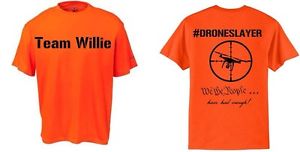William Merideth, the self-proclaimed drone slayer who shot down a drone over his Kentucky home last year, has filed a new legal response to the lawsuit brought against him by the drone’s owner. Merideth argues that the case should be dismissed because the federal court lacks jurisdiction, ArsTechnica reports. The drone slayer case began when William Merideth shot down a drone flying over his home in June 2015. While the case was dismissed locally – the judge saying that Merideth “had a right to shoot down that drone,” the operator of the drone, David Boggs, filed a lawsuit in January asking the Louisville court to overturn the ruling and asking for $1,500 in damages. Similar cases, such as the recent incident involving a NJ man accused of shooting down a drone, have ended differently – in the NJ case the shooter pleaded guilty to criminal mischief charges and was fined accordingly.
The case has deeper implications than those on the surface: by ruling that Merideth was within his rights to shoot down a drone flying over his property, the local judge opened up larger questions about the airspace over private property: who owns it, and who has jurisdiction over it? Drone enthusiasts and businesses as well as the FAA have been watching the case to see if a significant precedent will be set, which could have an effect on drone regulations moving forward.
“The United States Government has exclusive sovereignty over airspace of the United States pursuant to 49 U.S.C.A. § 40103,” Boggs’ civil complaint reads. “The airspace, therefore, is not subject to private ownership nor can the flight of an aircraft within the navigable airspace of the United States constitute a trespass.”
While the drone community waits for a potentially significant ruling on the issue, Merideth doesn’t seem to want to serve as an example case. The drone slayer’s attorney wants the case removed from federal court, saying that Boggs’ attempt to try and obtain a declaratory judgement is not warranted. “…the Plaintiff wants this court to circumvent the argument [that the drone constituted trespass] and declare that there is no state law trespass. This is an improper use of 28 U.S.C. 2201. In reality, this is a Bullitt County small claims court case.”
Boggs and his attorney have until March 28 to reply.
Miriam McNabb is the Editor-in-Chief of DRONELIFE and CEO of JobForDrones, a professional drone services marketplace, and a fascinated observer of the emerging drone industry and the regulatory environment for drones. Miriam has penned over 3,000 articles focused on the commercial drone space and is an international speaker and recognized figure in the industry. Miriam has a degree from the University of Chicago and over 20 years of experience in high tech sales and marketing for new technologies.
For drone industry consulting or writing, Email Miriam.
TWITTER:@spaldingbarker
Subscribe to DroneLife here.
